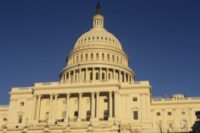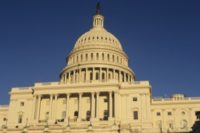In a letter to members of Congress yesterday, the American Public Health Association (APHA) strongly opposed attempts to repeal or weaken the Affordable Care Act.
"Any effort to repeal the ACA without ensuring a viable and immediate replacement plan is unconscionable and will put the health of the American people at an unacceptable risk," wrote APHA Executive Director Georges C. Benjamin, MD.
The letter is in response to a Senate budget resolution introduced yesterday in the new Congress that takes the first steps toward repealing the health law.
Benjamin outlined what is at stake, including the loss of services that save lives and improve health: Millions of previously uninsured Americans who now have affordable, comprehensive health insurance coverage will lose it, increasing health disparities and premature deaths. In addition, nearly 138 million individuals will lose access to preventive health care services such as vaccinations, disease screenings, well-child visits and tobacco cessation counseling without co-pays or deductibles through private health insurance. Thirty-nine million seniors will lose access to preventive services without cost through the Medicare program.
Under the law, millions of young adults up to age 26 are able to stay on their parents' health insurance plans and nearly 129 million individuals with pre-existing conditions are protected from insurance coverage denials. Benjamin said these protections are at risk.
"The ACA is critical to addressing the biggest challenges facing our health system," wrote Benjamin, including helping shift our health system from one that focuses on treating the sick to one that focuses on keeping people healthy.
"The ACA provides critical mandatory funding through the Prevention and Public Health Fund for community-based prevention and public health activities," he wrote. "The fund has already provided more than $6 billion to support a variety of public health activities in every state, including tracking and preventing infectious disease, community and clinical prevention programs, bolstering the public health infrastructure and workforce and expanding access to childhood immunizations."



